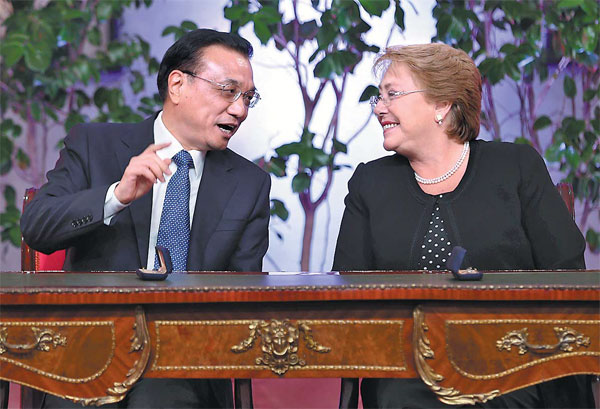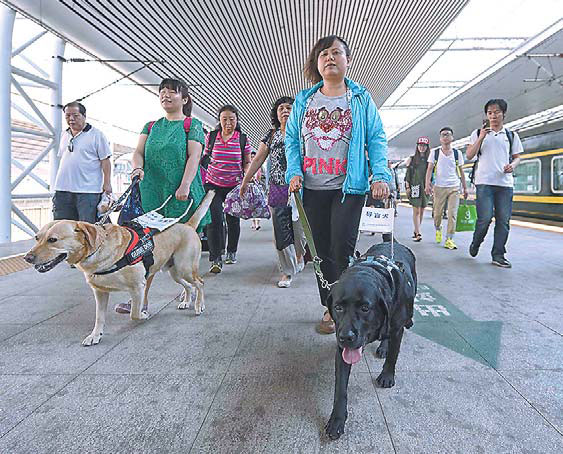What's news

| Premier Li Keqiang chats with Chilean President Michelle Bachelet in Santiago, Chile, on May 25. They witnessed the signing of a series of cooperative agreements including trade, industry, infrastructure, mining and culture. Liu Zhen / China News Service |
China, Chile agree on trade growth
China and Chile have agreed to expand bilateral free trade as they celebrate the 10th anniversary of their free trade agreement.
Premier Li Keqiang met with Chilean President Michelle Bachelet in Santiago on the last stop of his Latin American visit.
The leaders witnessed the signing of 18 cooperative agreements covering trade, finance, public infrastructure facilities construction, energy, industrial capacity cooperation, astronomy and cultural exchanges.
Li said China's cooperation with Chile can serve as a model for its relations with other Latin American countries.
"We're going to set up a yuan settlement bank in Chile, the first of its kind in Latin America," the premier said. "In addition, we have decided to award 50 billion yuan ($8.2 billion; 7.5 billion euros) of QFII quotas to Chile, in a move to promote financial cooperation." The QFII system enables foreign institutions to invest in China.
He said China is willing to take part in construction of a Chilean transcontinental tunnel that would connect the Pacific and Atlantic coasts.
Canada to return corrupt officials
Canada will help China to repatriate corrupt officials who have fled there as well as confiscate their assets, the North American country's top envoy said.
"Canada has had close collaboration with the Chinese government to address such issues," Guy Saint-Jacques, the Canadian ambassador to China, said. "We have no desire to harbor fugitives, and we don't want to be known as welcoming fugitives."
He said China and Canada will sign an agreement to share the assets that Chinese fugitives transfer illegally to Canada. Negotiations have been completed and the agreement should be finalized in the next few months, he said.
"It will provide a legal basis for Canada to share the proceeds of forfeited assets with China, once we identify the transferred illegal money belongs to criminals or criminal organizations," he said.
In recent years, Canada and the United States have been popular destinations for corrupt Chinese officials because of the lack of extradition treaties and difficulties caused by differences in the legal systems.
Terrorist groups busted in Xinjiang
Police have broken up 181 terrorist groups over the past year as part of a crackdown in the Xinjiang Uygur autonomous region, the authorities said on May 25.
According to the regional government, 96.2 percent of the groups were traced before they were able to commit crimes and 112 suspects surrendered to the police.
The anti-terrorism campaign was launched a day after the bombing of a market in Urumqi, the regional capital, killing 39 people in May last year.
Defense Ministry takes to new media
The Ministry of National Defense launched accounts on two leading Chinese social networking platforms on May 26, a move one analyst said will further boost China's transparency on defense issues.
The ministry's accounts were registered on Sina Weibo, a Twitter-like service, and the free messaging app WeChat.
On May 25, the ministry's first post on Weibo read: "There will be consistent exchanges and interactions with everyone in the future." Within six hours, the account had attracted more than 18,000 followers.
Previously, ministry spokesmen Geng Yansheng and Yang Yujun had interacted with Chinese netizens through a social media account set up by PLA Daily, the official newspaper of the People's Liberation Army.
Import tax slashed to boost sales
Import taxes on selected consumer goods are to be cut by an average of more than 50 percent, to encourage more people to spend at home rather than abroad.
The Ministry of Finance said on May 25 it will lower import taxes on products such as Western-style suits and fur garments, boots, disposable diapers and skin care products, starting June 1. The measure is to boost imports, promote domestic consumption and satisfy strong consumer demand for imported products.
The decision comes after the State Council said in April it was considering reducing import tariffs on consumer goods to stoke domestic spending.
Record numbers of middle-class Chinese are spending heavily overseas or buying cheaper consumer products from foreign websites through overseas shopping agents.
According to market consultants Bain & Co, Chinese consumers spent 380 billion yuan ($61.3 billion; 56 billion euros) on luxury products last year. About 55 percent of the purchases were made in overseas markets.
Li: Spain a partner for new market
China and Spain should work together to develop new markets in the developing world to promote economic growth, Premier Li Keqiang said on May 27 during a meeting with Spain's Deputy Prime Minister Soraya Saenz de Santamaria.
Li said the economies of China and Spain are highly complementary and have great potential for cultivating new markets in the developing world. He also said that China is willing to expand trade with Spain, as the countries celebrate the 10th anniversary of their comprehensive strategic partnership.
He urged Spain to offer simpler procedures for Chinese tourists and other visitors. Li arrived in Palma, Spain, for a stopover after finishing a four-nation tour of Latin America.
Shanghai OKs draft plan on innovation hub
Shanghai approved a draft plan on May 25 to build the city into a technology innovation center with global influence by 2030.
Construction of the center will further enhance a city that is already establishing an international economic center, a financial center, a trade center and a shipping center, China Securities Journal reported.
In March, Vice-Mayor Zhou Bo said the priority of the city's work agenda this year was "to greatly implement the strategy of innovation-driven development" and "to speed up establishing the technology innovation center", news website thepaper.cn reported.
Zhou said the government will pilot a new immigration policy and special tax rules for angel investors, identify more high-tech enterprises, and establish a strategic emerging industries board.
Ban on coal-fired plants in Beijing
Beijing will ban construction of coal-fired thermal power plants when the last four are replaced by gas-fired facilities, which is expected by 2017, the municipal economic planner said.
"Closures of the coal-fired power plants will greatly improve air quality, as 22 percent of air pollutants are from coal consumption," said Zhang Wangcai, deputy director of the Beijing Development and Reform Commission's Energy Bureau.
Two gas-fired thermal power plants went into operation in October and have reduced annual coal consumption by 3.95 metric tons, he said.
Beijing has also restricted coal consumption by companies and households by supplying gas or other cleaner fuels.
"By the end of this year, we will reduce coal consumption by 8 million tons," Zhang said, adding it has already been reduced by 7.1 million tons.
US charges 'reflect fears over technology'
Accusations against scientists and researchers with Chinese backgrounds show the United States' anxiety over China's rising technological capability, experts said.
"I don't know whether the US prosecutors' charges are grounded in fact or not, but recent cases show that the US government has a growing apprehension about China's development in science and technology," Tao Wenzhao, a senior researcher at the Chinese Academy of Social Sciences' Institute of American Studies, said on May 24.
"Such a notion has repeatedly appeared in US President Barack Obama's State of the Union addresses and US government department reports, highlighting the possibility that China will surpass the US in science and technology.
"The Americans know exactly how their political and military superiority in the world is based on economic ascendancy, which relies heavily on the nation's leadership in science and technology, so they have spared no effort to make sure such leadership will continue to belong to the US."
China no-fly list on the way
China's aviation authority is to introduce measures to blacklist passengers who are unruly when traveling on planes, part of efforts to ensure safety.
A system for blacklisting antisocial passengers who disobey aviation safety rules should be standardized soon and implemented in collaboration with airlines, travel agencies and airports, according to a regulation issued by the Civil Aviation Administration of China.
However, the Civil Aviation Management Institute of China has called for punishments to be discussed first among aviation authorities, airline representatives, passengers and legal experts.
| Guide dogs Zi Long (left) and Jenny guide their visually impaired owners, Wu Wenhao (left) and Chen Yan, as they prepare to take train at the Beijing Railway Station on May 25. Beijing started allowing visually impaired passengers to take guide dogs aboard trains on May 1. Hao Yi / China Daily |
(China Daily European Weekly 05/29/2015 page2)
Today's Top News
- Japan tempting fate if it interferes in the situation of Taiwan Strait
- Stable trade ties benefit China, US
- Experts advocate increasing scope of BRI to include soft power sectors
- New engine powers cargo drone expansion
- China to boost green industry cooperation
- Manufacturing PMI rises in November
































